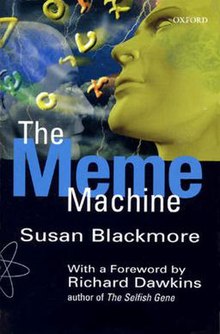The term "meme" was introduced by Richard Dawkins in The Selfish Gene (1976: 191-201), to refer to a proposed unit of cultural information analogous to the standard unit of genetic information: the gene. He suggested that evolutionary analysis of memes could cast light on cultural oddities that evolutionary genetics sometimes struggle to explain, such as religion. His original introduction of memes was a somewhat off-hand way of illustrating that evolution by natural selection need not only apply to DNA and biology, but almost by accident he invented an entirely new field. Memetics now refers to the study of evolutionary models of cultural information transfer, although whether or not this is something worthy of study is somewhat controversial. A Journal of Memetics was published online from 1997 to 2004 (and is still available), but probably the most famous account of memetics is Susan Blackmore's The Meme Machine (1999).
Everything looked a bit like this in the 90s.
Memetics has been criticised for failing to identify a discrete unit of transmission (a meme might be anything from a few notes to a whole philosophical theory), but as Blackmore points out the same can, in a sense, be said about genetics (1999: 53-6). The study of memes more generally is accused of being too vague, even pseudoscientific, and I agree that there is a genuine risk of failing to make any meaningful claims. However I think what matters is whether memetics is able to provide a useful account of phenomena where other fields have failed - and this will only become clear with time. Daniel Dennett's account of consciousness and the self includes a memetic element (1991: 199-226) and Blackmore hopes that memetics might cast light on everything from altruism (1999: 147-74) to the development of agriculture (ibid: 26-7). Whether or not memes actually exists (whatever "existing" means) is not really important - memetics as a discipline can still be provide a useful heuristic, reminding us that cultural practices might propagate themselves simply because that's what they do, not because they are in any way useful to us.
Blackmore, S. 1999. The Meme Machine. Oxford: OUP.
Dawkins, R. 1976 (2006). The Selfish Gene: 30th Anniversary Edition. Oxford: OUP
Dennett, D. 1991. Consciousness Explained. Little, Brown and Company.

No comments:
Post a Comment